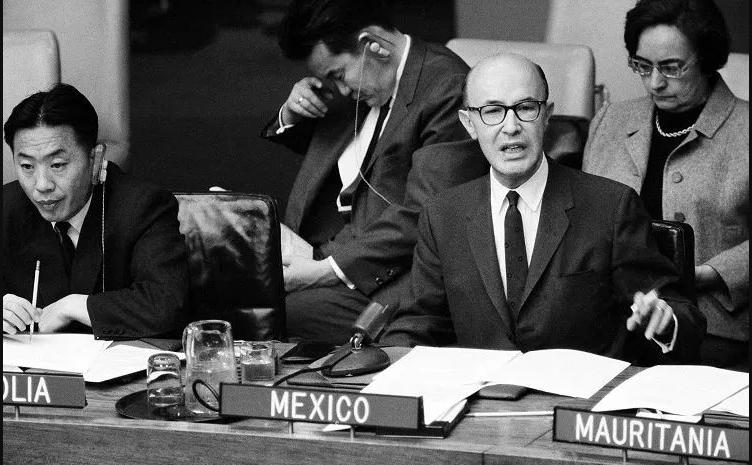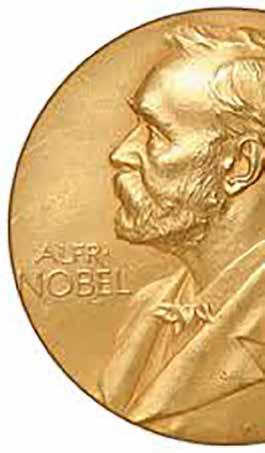
3 minute read
“Mr. Disarmament”
from MAGAZINE #21
by OMPP - WOFP
By Javier Hernández Mejía
Why should we, Mexicans, be proud of Alfonso García Robles? On December 10th, 1982, lawyer and diplomat Alfonso García Robles was awarded the Nobel Peace Prize in a solemn ceremony held in Oslo, Norway. Educated in the Universidad Autónoma de México, the University of Paris and The Hague Academy of International Law in the Netherlands, Mr. García Robles (Michoacán, Mexico, 1911 – Mexico City, 1991) was a committed and knowledgeable advocate of the movement against nuclear war.
Advertisement
Certainly, it is a must to remember that García
Robles served as President in the Ministry of Foreign Affairs of Mexico and then was appointed Mexican Ambassador to Brazil. Internationally, he excelled as a major-league diplomatic player in world affairs while serving as Mexico’s permanent representative to the United Nations in the New York headquarters. Because of his noteworthy performance, he was also entrusted with the mission of leading the Political Affairs Division of the UN. These experiences, naturally, endowed him with an invaluable diplomatic sensitivity to draw up the strategy to ban the use of weapons of mass destruction.
In 2020, the World Organization for Peace, WOFP, is commemorating the 51st anniversary of the Treaty for the Prohibition of Nuclear Weapons in Latin America and the Caribbean – Treaty of Tlatelolco –. This agreement was signed during the Cold War years as a means to counteracting nuclear threats such as the one that might have unleashed WWIII between the United States of America and the then-Soviet Union in the Caribbean Sea. Also known as the Cuban Missile Crisis, this menace led our planet to the brink of full destruction. Fortunately, U.S. President J.F. Kennedy prevented this apocalypse from happening.
As for the Treaty of Tlatelolco concerns, Mexican Ambassador García Robles, supporting Kennedy’s anti-war posture, was responsible for persuading Mexican President Adolfo López Mateos to lead the agreement process in the forums of multilateral diplomacy. Finally, the United Nations agreed with the treaty’s terms and endorsed the proceedings in 1967. In essence, the purpose of these statutes consisted on establishing a denuclearized zone in Latin America so as to ensure that this region of the world would never be implicated in hostilities between super powers. In recognition of this diplomatic success, García Robles, also known as Mr. Disarmament, was granted the Nobel Peace Prize.
Right after the signing of the Treaty of Tlatelolco, Mr. Disarmament and Colombian writer, Gabriel García Márquez, Nobel Prize in Literature in 1982, worked shoulder to shoulder to succeed in another important undertaking aimed at enforcing peace: the making of the Contadora Group. This movement elaborated its action plans to bring an end to the overwhelming pain endured by the inhabitants of Central America because of the military conflicts. Both Nobel Prize winners sought to implement basic human rights in the region as well.

In 1990, U.S. Senator J. William Fullbright and García Robles were honored through the creation of the Fullbright-García Robles scholarship whose main target was to channel human and financial resources to support both American and Mexican youngsters pursue a high-quality education. Regrettably, this acknowledgment represented the pinnacle of a series of priceless fulfillments in García’s prolific diplomatic career. On September 2nd, 1991, the father of nuclear disarmament died of kidney failure at the age of 80 in Mexico City.
Yet, it is our duty at the WOFP, as peace seekers, to honor him by respecting and carrying on his legacy. The nightmare of a devastating war through the detonation of nuclear warheads is far from being over, and the menace of mutual annihilation among nations still lurks in the shadows. Consequently, the WOFP has picked up the baton and has engaged in a great deal of defying struggles in order to further the banning of weapons of all kinds. All of us, Mexicans, cannot afford to let Alfonso García Robles as well as his work fade into oblivion.
On April 28th, 2017, an auction in New York sold off the Nobel Peace Prize medal that had been awarded to Ambassador Alfonso García Robles. The 18-carat gold medal was bought for almost half a million dollars by an anonymous buyer. Likewise, García’s wife donated his 1,100-book collection to the University of Virginia.
The International Day of Peace, officially declared by the United Nations, is celebrated with great hope in major events worldwide on September 21st each year. On occasion of this year’s festivities, the WOFP will take advantage of this scenario to pay a well-deserved homage to the father of disarmament, Alfonso García Robles, as a token of recognition for his transcendental diplomatic path. As a Mexican peacemaker, he spent a life-time fighting warhungry countries and saved millions of people from the ravaging effects of nuclear explosions, and learning from his achievements across the globe represents the best way not only to celebrate the International Day of Peace, but also to keep his endeavors alive in the mankind’s collective memory for good.
The WOFP is fully aware of the scope of the anti-war diplomatic accomplishments reached by Adolfo García Robles. Their impact in today’s developments has proven to be unthinkably powerful and beneficial to mankind, so we will thank him eternally. Notwithstanding, these triumphs haven’t been enough to get rid of the scourge of war, so human beings need to keep on fighting ceaselessly. As a conclusion, we heartily encourage our readers and the international community as a whole to follow suit and stand tall to achieve conditions of world peace and prosperity.

AGRADECIMIENTOS:
La Organización Mundial Por la Paz, agradece a todos los Colaboradores y Patrocinadores por el apoyo que han brindado para el desarrollo de la campaña Nacional de Apoyo: REDES SOLIDARIAS.
+52 1 55 6513 0950
OMPP- Organización Mundial por la Paz Mexico ompp.official








